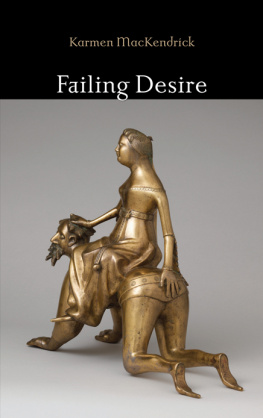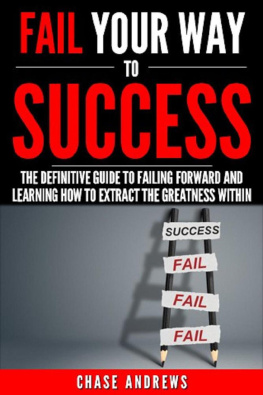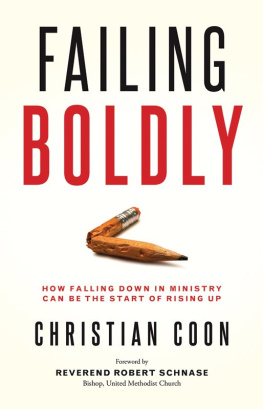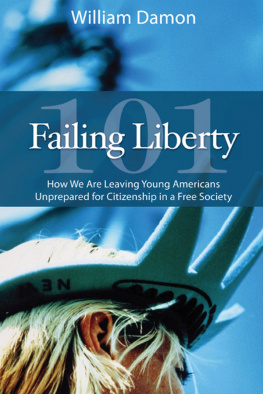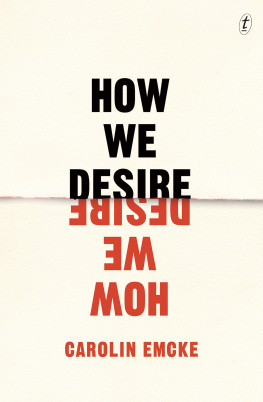MacKendrick Karmen - Failing Desire
Here you can read online MacKendrick Karmen - Failing Desire full text of the book (entire story) in english for free. Download pdf and epub, get meaning, cover and reviews about this ebook. year: 2017, publisher: State University of New York Press, genre: Religion. Description of the work, (preface) as well as reviews are available. Best literature library LitArk.com created for fans of good reading and offers a wide selection of genres:
Romance novel
Science fiction
Adventure
Detective
Science
History
Home and family
Prose
Art
Politics
Computer
Non-fiction
Religion
Business
Children
Humor
Choose a favorite category and find really read worthwhile books. Enjoy immersion in the world of imagination, feel the emotions of the characters or learn something new for yourself, make an fascinating discovery.
- Book:Failing Desire
- Author:
- Publisher:State University of New York Press
- Genre:
- Year:2017
- Rating:3 / 5
- Favourites:Add to favourites
- Your mark:
- 60
- 1
- 2
- 3
- 4
- 5
Failing Desire: summary, description and annotation
We offer to read an annotation, description, summary or preface (depends on what the author of the book "Failing Desire" wrote himself). If you haven't found the necessary information about the book — write in the comments, we will try to find it.
Failing Desire — read online for free the complete book (whole text) full work
Below is the text of the book, divided by pages. System saving the place of the last page read, allows you to conveniently read the book "Failing Desire" online for free, without having to search again every time where you left off. Put a bookmark, and you can go to the page where you finished reading at any time.
Font size:
Interval:
Bookmark:

FAILING
DESIRE
Karmen MacKendrick
Failing
Desire
COVER IMAGE : Aquamanile in the Form of Aristotle and Phyllis .
Southern Netherlands, late 14th or early 15th century. Bronze, 32.5 cm x 17.9 cm.
Robert Lehman Collection, 1975 (1975.1.1416).
Courtesy of The Metropolitan Museum of Art.
Published by
S TATE U NIVERSITY OF N EW Y ORK P RESS , A LBANY
2018 State University of New York
All rights reserved
Printed in the United States of America
No part of this book may be used or reproduced in any manner whatsoever without written permission. No part of this book may be stored in a retrieval system or transmitted in any form or by any means including electronic, electrostatic, magnetic tape, mechanical, photocopying, recording, or otherwise without the prior permission in writing of the publisher.
For information, contact State University of New York Press, Albany, NY
www.sunypress.edu
Production, Laurie D. Searl
Marketing, Kate R. Seburyamo
Library of Congress Cataloging-in-Publication Data
Names: MacKendrick, Karmen, [date] author.
Title: Failing desire / Karmen MacKendrick.
Description: Albany, NY : State University of New York Press, [2018] | Includes bibliographical references and index.
Identifiers: LCCN 2017018231 (print) | LCCN 2017041860 (ebook) | ISBN 9781438468921 (e-book) | ISBN 9781438468914 (hardcover : alk. paper) | ISBN 9781438468907 (pbk.)
Subjects: LCSH: Failure (Psychology) | Shame. | Humiliation.
Classification: LCC BF575.F14 (ebook) | LCC BF575.F14 M33 2018 (print) | DDC 128dc23
LC record available at https://lccn.loc.gov/2017018231
10 9 8 7 6 5 4 3 2 1
What exceeds the system is the impossibility of its failure, and likewise the impossibility of its success. Ultimately nothing can be said of it, and there is a way of keeping still (the lacunary silence of writing), that halts the system, leaving it idle, delivered to the seriousness of irony.
Maurice Blanchot, The Writing of the Disaster
While the chapters in this book have not been previously published in their current forms, they do draw concepts, conceptual moves, paragraphs and passages from many of my presentations and essays over the years. These should be acknowledged, along with my deep gratitude to those who invited me to say or to write them, and those, too many to name, who listened.
Material related to obedience was presented at The Body: Ethos and Ethics , the meeting of Foucault Society Conference in 2006, at the invitation of Terri Gordon; and at the seminar Desire, Love and Sexuality in Medieval Thought , at Lewis University in 2010. The Augustinian material there was refined for a seminar presentation with Virginia Burrus and Mark Jordan at Berkeleys Graduate Theological Union, at the invitation of Daniel Boyarin. We eventually developed the seminar material into Seducing Augustine: Bodies, Desires, Confessions (Fordham, 2010).
Impossible Confessions , the basis of chapter 2, was refined over the course of two presentations: The Sacred and the Debased in the Work of Georges Bataille , at Occidental College in 2008, at the invitation of Malek Moazzam-Doulat; and The Space of Community in the Work of Georges Bataille , at the Society for Phenomenology and Existential Philosophy in 2010. A version of that presentation was published in the anthology Material Spirit , edited by Carl Good and Manuel Assensi (Fordham, 2013).
An invitation from the graduate students in religion at Syracuse University to present an opening keynote at their conference The Monstrous, the Marginalized, and Transgressive Forms of Humanity, in 2013, first prompted me to think about the kinds of visuality that are central to chapter 3.
Finally, material that is related more broadly to the book rather than to any particular chapter appears in Pornotopias: Image, Apocalypse, Desire , edited by Louis Armand, Jane Lewty, and Andrew Mitchell (Litteraria Pragensia, 2010); Analecta Hermeneutica vol. 4, 2012, guest edited by Michelle Rebidoux; and Querying Consent , edited by Jordana Greenblatt and Keja Valens (Rutgers UP, forthcoming). I am also indebted to Ed Casey, who invited me to discuss Jacob Rogozinskis work at the symposium in his honor, Envelopes of Flesh , at Stony Brook University in 2014.
This is the sort of book for which people may not be especially eager to receive thanks or participation credit, but I am at least indebted to those friends and colleagues who provided me with references and useful suggestions for sources, including Jennifer Glancy, Virginia Burrus, Cary Howie, and Kathleen Costello-Sullivan. I believe that it was from Catherine Keller that I first heard Keatss idea of negative capability. Orly Nave recommended to me the Velleman essay on original sin that Ive used here, though the essay itself is more intriguing than my use might suggest.
I am particularly grateful to the Research and Development Committee at Le Moyne College, which supported my work through a summer grant in 2016. I continued to work on the manuscript during part of my time as a fellow at the Cornell Society for the Humanities, surely one of the best work environments in the world.
The manuscript reports from Kent Brintnall and William Robert were invaluable resources for improving this text, and I am lastingly grateful to both readers for their intelligence and insight. SUNYs Andrew Kenyon is the very model of an academic editor, managing to combine encouragement, efficiency, and an impressive measure of patience; it has been a great pleasure to work with him. I have been delighted as well by the privilege of working again with production editor Laurie Searl, who produced my first book when we were both young.
Finally, as the one who endures the disorderly distractedness of me-writing and the grouchy anxiety of me-not-writing with equal aplomb, Alan Griffin has once more earned my deepest thanks.
ONE
THE FAILURE OF WRITING
What is this madness that must be excluded (tragically) in order to constitute our culture, the modern West? It is nothing else, Foucault replies at once, than the absence of oeuvre.
Mark Jordan, Convulsing Bodies
This book is about secrets and failures, so it is unsurprising that it resisted its own writing. As Eve Sedgwick has pointed out, we are deeply susceptible to the shame of others, and it is shameat the depths of humiliation and subordinationthat I take up here; shame, the various kinds of failure occasioning it and occasioned by it, and the ability to find in that failure a strange, secretive, and curiously resistant pleasure. To speak or write about what is shameful, many authors agree, is to risk doubly shaming oneself, adding the subject matter to the shameful imposition that characterizes all speech, acknowledging ones own complicity in the act of embarrassing oneself. What necessity compels such repeated failure?
I begin with the suspicion that humiliation and failure are entangled. The necessity that seeks each one is driven by will, and knowledge, and the will to know. , on auricular confession, makes use of some of the same Foucauldean theory, but also of work from Georges Batailles theories of speech and sacrifice, to explore the strange infolding by which the construction and undermining of the speaking subject occasion each other. The effort to know the depths of the confessing subject turns those depths inside out, leaving us to suspect that they were in fact flexible surfacesand that something remains, unsaid, however thoroughly we try to unfold them. The will to know and our ability to say what we know run into a mystery, a secret. The secret, we begin to see, will not allow us to hold on to a sense of self with a clear inside and out. Just as we necessarily fail to obey perfectly, so too we are unable to confess everything.
Font size:
Interval:
Bookmark:
Similar books «Failing Desire»
Look at similar books to Failing Desire. We have selected literature similar in name and meaning in the hope of providing readers with more options to find new, interesting, not yet read works.
Discussion, reviews of the book Failing Desire and just readers' own opinions. Leave your comments, write what you think about the work, its meaning or the main characters. Specify what exactly you liked and what you didn't like, and why you think so.

